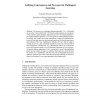Free Online Productivity Tools
i2Speak
i2Symbol
i2OCR
iTex2Img
iWeb2Print
iWeb2Shot
i2Type
iPdf2Split
iPdf2Merge
i2Bopomofo
i2Arabic
i2Style
i2Image
i2PDF
iLatex2Rtf
Sci2ools
LAMAS
2005
Springer
2005
Springer
Unifying Convergence and No-Regret in Multiagent Learning
We present a new multiagent learning algorithm, RVσ(t), that builds on an earlier version, ReDVaLeR . ReDVaLeR could guarantee (a) convergence to best response against stationary opponents and either (b) constant bounded regret against arbitrary opponents, or (c) convergence to Nash equilibrium policies in self-play. But it makes two strong assumptions: (1) that it can distinguish between self-play and otherwise non-stationary agents and (2) that all agents know their portions of the same equilibrium in self-play. We show that the adaptive learnng rate of RVσ(t)that is explicitly dependent on time can overcome both of these assumptions. Consequently, RVσ(t)theoretically achieves (a’) convergence to near-best response against eventually stationary opponents, (b’) no-regret payoff against arbitrary opponents and (c’) convergence to some Nash equilibrium policy in some classes of games, in self-play. Each agent now needs to know its portion of any equilibrium, and does not need t...
| Added | 28 Jun 2010 |
| Updated | 28 Jun 2010 |
| Type | Conference |
| Year | 2005 |
| Where | LAMAS |
| Authors | Bikramjit Banerjee, Jing Peng |
Comments (0)

